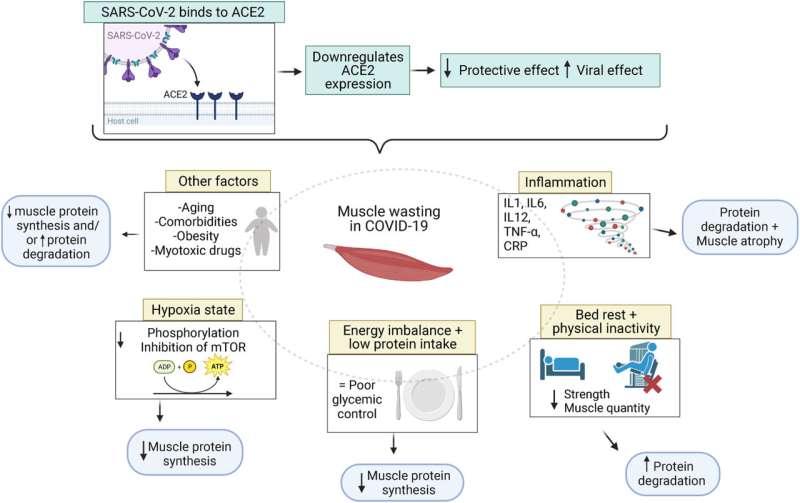This article has been reviewed according to Science X's editorial process and policies. Editors have highlighted the following attributes while ensuring the content's credibility:
fact-checked
peer-reviewed publication
trusted source
proofread
Low muscle mass and level of body fat could make people more vulnerable to COVID, study suggests

Levels of muscle mass and body fat play a pivotal role in COVID-19 prognosis and recovery, according to new University of Alberta research.
In a review of several studies, the researchers found that abnormalities in body composition were prevalent in patients hospitalized with COVID-19 and were often associated with more severe disease and poorer outcomes, including higher risk of death.
The findings, published in The American Journal of Clinical Nutrition, provide a "comprehensive understanding of how COVID-19 adversely affects people with different body composition," says Montserrat Montes-Ibarra, one of the study's lead authors and a Ph.D. candidate in nutrition and metabolism in the Faculty of Agricultural, Life & Environmental Sciences.
"The amount of muscle and fat you have are key factors in determining how vulnerable you are to COVID-19 and how you will respond to it."
Low muscle, high fat pose risks
The analysis of 62 large and small studies spanned 1.3 million people battling COVID-19 up to the fall of 2022. Overall, it showed that patients who had poor muscle health and high levels of visceral fat at the time of their COVID-19 diagnosis had a greater risk of developing complications while ill.
In 44% of the studies exploring low muscle mass, the condition was associated with death from COVID-19, along with the need for intensive care unit admission, mechanical ventilation and longer hospital stays, the review showed.
Overall results also showed that up to 90% of COVID-19 patients in the studies had lower muscle mass than people with other diseases such as cancer, at 69%.
"That means COVID may have left many people with substantially lower amounts of muscle as they were battling the disease," which is a difficult benefit to regain, notes Montes-Ibarra.
"Muscle loss is like a wildfire: it's lost very quickly, but to recover it takes months and years. And those people who survive COVID may have much lower muscle than they had before.
"For someone now on a trajectory of normal aging or dealing with long COVID, that could impact their longevity."
High fat mass was also linked to mortality in 38% of the studies exploring this measure. High levels of fat in the muscle led to high rates of mortality and intensive care admission, as well as longer hospitalization in more than 50% of the studies examined.
As well, high visceral fat, found around vital abdominal organs, was linked to intensive care admission in 85% of the studies that considered this factor. In addition, mechanical ventilation was associated with high levels of fat in the muscle in nearly 47% of studies looking at this measure.
Along with that, phase angle, an indicator of muscle health, was found to be related to mortality in 75% of the studies exploring this aspect.
Muscle matters to health
The findings all highlight how important muscle mass is to health, says professor Carla Prado, a nutrition expert in the Faculty of Agricultural, Life & Environmental Sciences and senior author on the review.
"Muscle function is vital for movement, balance and posture, and for metabolizing glucose and providing amino acids for the immune system. The more muscle you lose, the greater the consequences."
Although it is most likely that patients had low muscle mass before they contracted COVID-19, the virus itself could have contributed to rapid muscle loss, Prado says.
"Coupled with muscle loss related to hospitalization and immobility, this may lead to a pandemic of low muscle mass among these patients," she adds.
Body composition beats BMI for assessment
Body composition could also be important in understanding and managing patients with long COVID, the researchers suggest.
Lower muscle mass could lead to longer recovery time from illnesses including COVID-19, may be linked to the fatigue that people with long COVID experience and could also influence other factors such as immune function, Montes-Ibarra notes.
"By assessing body composition, it's possible for health-care providers to better tailor management strategies and interventions for long COVID patients, which may improve their outcomes and quality of life, reduce the risk of health complications and lead to more personalized, effective treatment, like nutritional support and physical rehabilitation."
Body fat and muscle mass assessment should be further explored as a potential prognostic tool for COVID-19 for all patients, the researchers recommend in their review.
Those factors aren't always considered during hospital admission, if the patient appears to have normal or even high body mass index, says Camila Orsso, one of the review's lead authors and a Ph.D. student in nutrition and metabolism.
"Because people with obesity bear their own body weight, they are frequently assumed to not be at risk for low muscle mass, and that they have the 'reserves' to fight COVID, when they may not."
"Taking body composition into account as part of overall care can help identify people at higher risk for developing more severe complications or poorer outcomes," Orsso notes. "That can help health-care professionals minimize the impact of COVID-19 and improve patient outcomes in the future."
More information: Montserrat Montes-Ibarra et al, Prevalence and clinical implications of abnormal body composition phenotypes in patients with COVID-19: a systematic review, The American Journal of Clinical Nutrition (2023). DOI: 10.1016/j.ajcnut.2023.04.003
















